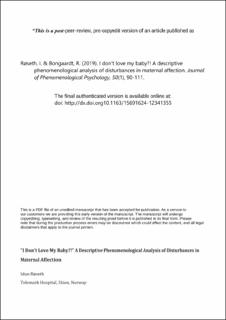| dc.description.abstract | Many new mothers question the nature of their motherly love after birth. This affectionate relationship towards the infant is commonly called bonding in everyday speech, clinical practice and research. Bonding may not sufficiently describe the mother’s emotional response to the infant and does not capture the ambivalence and struggle to develop maternal affection of many women. This study aims to explore the phenomenon of disturbed maternal affection through the clinical case of one mother who experienced severe and prolonged disturbances. Two in-depth interviews led to a descriptive phenomenological analysis. The mother developed depressive symptoms from not feeling enough for her child, not the opposite, as is often hypothesized. We describe and discuss crucial constituents of her experience, such as ambivalence, remoteness, boredom, guilt, and the looming repetition of parenting patterns, and a solution resulting from therapy-enhanced reflection on motherhood vis-à-vis early life patterns, sociocultural expectations and existential predicaments. | en_US |
